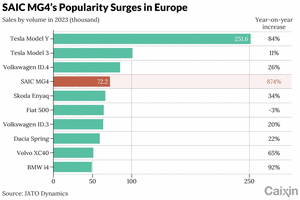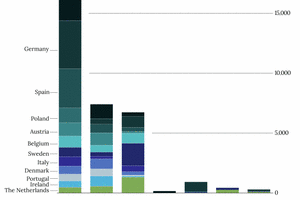China Vows to Defend EV-Makers as EU Confirms Additional Import Duties
Listen to the full version
China has denounced the European Commission’s plan to definitely impose tariff hikes on all electric vehicles (EVs) shipped from the country as “unreasonable,” and vowed to take “all necessary measures” to defend Chinese companies.
The commission on Tuesday announced an adjusted set of proposed additional duties on China-made EVs as part of an ongoing investigation that found state subsidies are enabling Chinese electric-car makers to undercut their European rivals.

Download our app to receive breaking news alerts and read the news on the go.
Get our weekly free Must-Read newsletter.
- DIGEST HUB
- China criticized the EU's planned tariff hikes on Chinese EVs and vowed to defend its companies.
- In response, China launched an anti-subsidy investigation into EU dairy products.
- The EU's revised tariffs range from 9% to 36.3% on various Chinese automakers, with Tesla facing the lowest increase.
China has expressed strong disapproval over the European Commission’s decision to implement tariff hikes on all electric vehicles (EVs) imported from China, denouncing it as "unreasonable" and vowed to take "all necessary measures" to protect Chinese companies [para. 1]. The European Commission's announcement on Tuesday revealed an adjusted proposal for additional duties on China-made EVs, resulting from an ongoing investigation that concluded state subsidies were enabling Chinese electric-car makers to underprice their European competitors [para. 2].
In a further escalation of trade tensions, China initiated an anti-subsidy investigation into European Union dairy products the following day. The Ministry of Commerce communicated that the probe was commenced at the behest of Chinese industry groups and would focus on products like fresh and processed cheese [para. 3].
The European Commission decreased the latest EV tariff hikes slightly from the provisional levels: MG-owner SAIC Motor Corp. Ltd. now faces a 36.3% duty, Volvo Car AB parent Geely Automobile Holdings Ltd. a 19.3% duty, and BYD Co. Ltd a 17% duty [para. 4]. Tesla Inc., however, received a comparatively lower tariff of 9%, a relief attributed to fewer subsidies from Beijing for foreign-owned companies [para. 6]. Earlier, Tesla had sought individual assessment from the EU, resulting in officials visiting its plants in China [para. 7].
Companies like Dongfeng Motor Group Co. Ltd. and Nio Inc. that cooperated with the investigation but weren’t specifically surveyed face a 21.3% tariff, while other non-cooperative manufacturers will encounter a 36.3% duty. These new rates will be in addition to the 10% duty already imposed on Chinese exporters [para. 8].
China’s Ministry of Commerce responded through a statement on Tuesday, condemning the European investigation as having a "predetermined conclusion.” They indicated that the government, along with automakers, submitted extensive legal documents and evidential support in various forms to counter the commission’s “unreasonable and non-compliant practices” [para. 10][para. 11]. The ministry accused the EU of basing its latest findings on unilateral facts and called for a rational and pragmatic approach to resolving the issue, urging the EU to prevent further escalation of trade tensions [para. 12].
Chinese companies such as SAIC, Geely, and BYD have yet to make public statements on the revised tariffs. They have until August 30 to comment and request hearings regarding the proposal. Should a qualified majority of member states fail to reject the measures in a binding vote, the European Commission will finalize the regulation by October 30, making the duties effective for five years with the possibility of extension [para. 14].
The China Chamber of Commerce to the EU also communicated its "strong dissatisfaction and firm opposition" in a statement, arguing insufficient evidence of substantial material injury caused by Chinese EVs to the EU market [para. 15]. The commission’s investigation, officially launched in early October, had preliminarily found that China’s battery-EV value chain benefits from unfair subsidies, posing an economic threat to EU BEV producers [para. 17].
Some EU member states, including Germany and Hungary, have resisted the tariffs, but a majority is needed to halt their implementation [para. 18].
Provisional duties, introduced on July 5, have already impacted the market. Registrations of new EVs by Chinese automakers in the EU decreased by 45% from June, with SAIC’s MG brand reporting a 20% sales drop and Geely’s Polestar brand seeing a 42% decline in sales [para. 19][para. 20].
This summary illustrates the evolving trade conflict between China and the EU over EV tariffs, highlighting key developments and the broader implications for both markets.
- SAIC Motor Corp. Ltd.
- SAIC Motor Corp. Ltd., the owner of the MG brand, faces a revised additional duty of 36.3% on its electric vehicles imported into the European Union. The EU's investigation into state subsidies leading to such tariffs is impacting SAIC's sales, with the MG brand experiencing a 20% drop in sales last month compared to a year earlier. The company has until Aug. 30 to comment or request hearings on the proposed tariffs.
- Geely Automobile Holdings Ltd.
- Geely Automobile Holdings Ltd., the parent company of Volvo Car AB, faces a revised additional duty of 19.3% on its electric vehicles exported to the European Union. The tariffs are part of the EU's ongoing investigation into alleged state subsidies for Chinese EV manufacturers, which are claimed to undercut European competitors. The company has until Aug. 30 to provide comments and request hearings on the proposal.
- BYD Co. Ltd.
- BYD Co. Ltd. is set to face a 17% tariff on EVs shipped to the European Union as part of the EU's revised tariff hikes on China-made electric vehicles. This is part of an ongoing investigation by the European Commission into state subsidies. BYD has not yet issued a public statement regarding the revised tariffs and has until August 30 to provide comments and request hearings on the proposal.
- Dongfeng Motor Group Co. Ltd.
- Dongfeng Motor Group Co. Ltd., which cooperated with the EU investigation but wasn’t surveyed, will face a 21.3% tariff on its electric vehicles (EVs) exported to the EU, up from the previous 20.8%. This tariff is part of the European Commission’s measures against state-subsidized Chinese EVs unfairly undercutting European competitors.
- Nio Inc.
- Nio Inc. cooperated with the EU investigation but wasn't specifically surveyed. Consequently, it faces a tariff of 21.3%, up from the previous 20.8%, pending approval. These new tariffs come in addition to the existing 10% duty on Chinese exports.
- Tesla Inc.
- Tesla Inc. faces a 9% tariff on its China-made EVs, which is lower than tariffs on competitors due to fewer subsidies from Beijing. Tesla requested individual assessment by the EU and received visits to its Chinese plants.
- Early October 2023:
- The European Commission officially launched an investigation into China's battery-EV value chain.
- Early July 2024:
- The European Commission stated its investigation showed the battery-EV value chain in China benefits from unfair subsidization.
- July 2024:
- The number of new EVs produced by Chinese automakers that were registered in the EU fell 45% from June.
- July 5, 2024:
- Provisional duties on Chinese EVs took effect.
- Tuesday, August 20, 2024:
- The European Commission announced an adjusted set of proposed additional duties on China-made EVs.
- Tuesday, August 20, 2024:
- The Ministry of Commerce of China stated that tens of thousands of pages of legal documents and evidence were submitted in a rebuttal against the commission's investigation.
- Wednesday, August 21, 2024:
- China launched an anti-subsidy investigation into European Union dairy products.
- PODCAST
- MOST POPULAR







 Sign in with Google
Sign in with Google
 Sign in with Facebook
Sign in with Facebook
 Sign in with 财新
Sign in with 财新